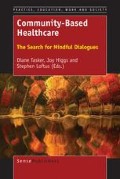Abstract
Throughout the ages, people have always been cared for at home when they have become ill or disabled. However, in Western society, the introduction of hospitals and the hegemony of specialist medical practices over the last century may have affected the place of community-based healthcare within healthcare systems.
Access this chapter
Tax calculation will be finalised at checkout
Purchases are for personal use only
Preview
Unable to display preview. Download preview PDF.
References
Aldridge, D., & Stevenson, C. (2001). Social poetics as research and practice: Living in and learning from the process of research. Nursing Enquiry, 8(1), 19-27.
Australian Institute of Health and Welfare (AIHW). National Centre for Ethical Education, Commission on Higher Education. (2011). Retrieved from http://www.aihw.gov.au/health-priority-areas/
Australian Physiotherapy Association (APA) (2005). The health workforce. Presented to the Productivity Commission. St Kilda. Retrieved from http://www.pc.gov.au/inquiries/completed/health-workforce/submissions/sub065/sub065.pdf
Bishop, A., & Scudder, J. (1990). The practical, moral, and personal sense of nursing: A phenomenological philosophy of practice. Albany: State University of New York Press.
Coles, M., & McLean, V. (2003). Therapeutic relationships re-defined. Occupational Therapy in Mental Health, 19(2), 33-56.
Denzin, N., & Lincoln, Y. (2000). Introduction: The discipline and practice of qualitative research. In N. Denzin & Y. Lincoln (Eds.), Handbook of qualitative research (2nd ed., pp. 1-36). Newbury Park, CA: Sage.
Frank, A.W. (1995). The wounded storyteller. Chicago: The University of Chicago Press.
Frank, A. W. (2002). At the will of the body: Reflections on illness. New York: Houghton Mifflin.
Frank, A. W. (2004). The renewal of generosity: Illness, medicine and how to live. Chicago: The University of Chicago Press.
French, S., & Sim, J. (2004). Physiotherapy: A psycho-social approach. (3rd ed.). London: Elsevier.
Furman, R. (2006). Poetic forms and structures in qualitative health research. Qualitative Health Research, 16(4), 560-566.
Ginter, P., Swayne, L., & Walter, J. (2002). Strategic management of healthcare organisations (4th ed.). Carlton, VIC: Blackwell.
Heckman K. A, & Cott C. A. (2005). Home-based physiotherapy for the elderly: A different world. Physiotherapy Canada, 57(4), 274-283.
Heidegger, M. (1962). Being and time. Oxford: Blackwell.
Higgs, J., Richardson, B., & Abrandt Dahlgren M. (Eds.) (2004). Developing practice knowledge for health professionals. Oxford: Butterworth Heinemann.
Kvale, S., (1996). Interviews: An introduction to qualitative research interviewing. Thousand Oaks, CA: Sage.
Lechner, V., & Neal, M. (1999). Work and caring for the elderly. Philadelphia: Routledge.
Marshall, C., & Rossman, G. (1999). Designing qualitative research. Newbury Park, CA: Sage.
Mattingly, C. (1993). What’s all this fuss about phenomenology? Physical Therapy, 73(2), 44-46. Retrieved from http://ptjournal.apta.org/content/73/2/98.full.pdf
Mattingly, C. (1998). Healing dramas and clinical plots: The narrative structure of experience. Cambridge, UK: Cambridge University Press.
Park, P. (1972). Domiciliary physiotherapy. The Australian Journal of Physiotherapy, 18(3), 77-78.
Ryle, G. (1949). Concept of the mind. London: Hutchinson and Company.
Ryle, G. (1971). Collected papers. Volume II collected essays, 1929-1968. London: Hutchinson.
Schreiber, J., & Stern, P. (2005). A review of the literature on evidence-based practice in physical therapy. The Internet Journal of Allied Health Sciences and Practive, 3(4). Retrieved from http://ijahsp.nova.edu/articles/vol3num4/schreiber.pdf
Schwandt, T. (2003). ‘Back to the rough ground!’ Beyond theory to practice in evaluation. Evaluation. 9(3), 353-364.
Shaw, J. A., & DeForge, R. T. (2012). Physiotherapy as bricolage: Theorizing expert practice. Physiotherapy Theory and Practice, 28(6), 420-427.
Shotter, J. (1998). Social construction as social poetics: Oliver Sacks and the case of Dr P. In B. Bayer & J. Shotter (Eds.). Reconstructing the psychological subject: Bodies, practices, and technologies (pp. 33-52). London: Sage.
Shotter, J. (1999). At the boundaries of being: Re-figuring intellectual life. First draft of a plenary address presented at the University of New Hampshire (UBH) conference: Social Construction and Relational Practices, Sept 16th-19th, Durham, New Hampshire, USA. Retrieved from http://pubpages.unh.edu/~jds/UNH-99.htm
Shotter, J. (2008). Conversational realities revisited: Life, language, body and world. (2nd ed.).London: Sage.
Spence, D. G. (2001). Hermeneutic notions illuminate crosscultural nursing experiences. Journal of Advanced Nursing, 35(4), 624-630.
Struber, J. (2003). Physiotherapy in Australia – where to now? Internet Journal of Allied Health Sciences and Practice. Retrieved from http://ijahsp.nova.edu/articles/1vol2/StruberPhysio.html
Tasker, D. (2013). Mindful dialogues in community-based physiotherapy (Unpublished PhD thesis).Charles Sturt University, Australia.
van Manen, M. (1990). Researching lived experience: Human science for an action sensitive pedagogy.(2nd ed.). London, ONT: Althouse.
United Nations. (1986). The Ottowa Charter for Health Promtion – Charter adopted at an international conference on health promotion: The move towards a new public health. Paper presented at the First International Conference in Health Promotion, Nov. 17-21, 1986, Ottawa, Ontario, Canada.
Retrieved from http://www.who.int/healthpromotion/conferences/previous/ottawa/en/index3.html
World Health Organization (WHO). (2007). People at the centre of health care: Harmonizing mind and body, people and systems (NLM classification: WC 503.1). Geneva: WHO.
Author information
Authors and Affiliations
Editor information
Editors and Affiliations
Rights and permissions
Copyright information
© 2017 Sense Publishers
About this chapter
Cite this chapter
Tasker, D., Higgs, J. (2017). Constructing Mindful Dialogues in Healthcare. In: Tasker, D., Higgs, J., Loftus, S. (eds) Community-Based Healthcare. Practice, Education, Work and Society. SensePublishers, Rotterdam. https://doi.org/10.1007/978-94-6300-995-9_2
Download citation
DOI: https://doi.org/10.1007/978-94-6300-995-9_2
Publisher Name: SensePublishers, Rotterdam
Online ISBN: 978-94-6300-995-9
eBook Packages: EducationEducation (R0)

